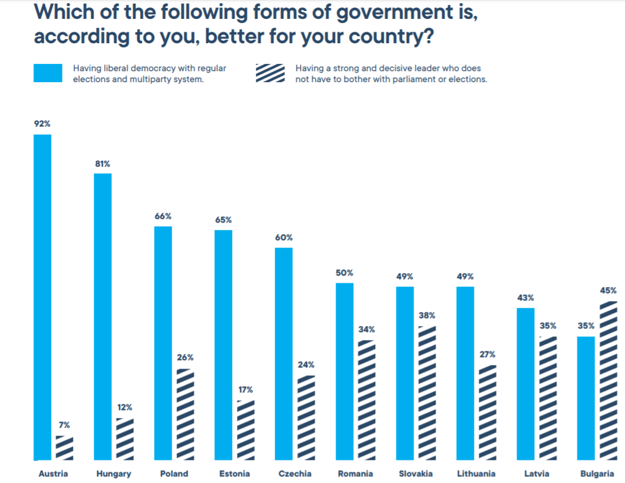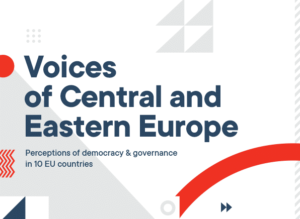
GLOBSEC
Corruption, populism, nationalism and disinformation have eroded faith in liberal democracy in Central and Eastern Europe, according to a new report – which says many people would trade in some of their freedoms for greater security and traditional values, Miroslava German Sirotnikova writes for BIRN.
At times of instability and insecurity reinforced by the COVID-19 pandemic, democracies can become particularly fragile. A belief in good governance, trustworthy media and institutions, and active civil society are now crucial for the democratic societies to get back on feet, move forward and overcome societal and economic challenges of the near future. But what if the societies lack these components? GLOBSEC researchers Dominika Hajdu, Katarína Klingová ask.
Only in 5 out of 10 countries, more than 50% of respondents would choose liberal democracy over an autocratic leader, the report finds. The most supportive of liberal democracy were Austrians with 82% showing support and the least Bulgarians with 35%.
 GLOBSEC’s new report Voices of Central and Eastern Europe: Perceptions of democracy & governance in 10 EU countries, provides a unique insight into satisfaction with democracy and current governance systems in 10 Central and Eastern European countries: Austria, Bulgaria, Czechia, Estonia, Hungary, Latvia, Lithuania, Poland, Romania and Slovakia, they add.
GLOBSEC’s new report Voices of Central and Eastern Europe: Perceptions of democracy & governance in 10 EU countries, provides a unique insight into satisfaction with democracy and current governance systems in 10 Central and Eastern European countries: Austria, Bulgaria, Czechia, Estonia, Hungary, Latvia, Lithuania, Poland, Romania and Slovakia, they add.
Key Findings:
- In countries with higher rankings in democracy quality indexes, respondents are more satisfied with their current governance system.
- Support for liberal democracy is not straightforward in the region. Only in 5 of 10 countries, more than 50% of the respondents would choose liberal democracy over an autocratic leader.
- Only Austrians, Estonians and Czechs are more satisfied with their governance system than dissatisfied.
- There is a strong recognition of income inequality and systemic favoritism for those with contacts to elites and higher incomes – on average, 70% in the region believe that those with contacts to political elites are favored in society.
- The majority of CEE respondents does not believe the narrative that their values are under threat due to the “West” – only 28% on average believe so.
- On average, only 44% in the region trust the media. But at the same time, in Austria, Czechia, Romania and Slovakia, more than 70% believe that media is rather or completely free of influence.
- Those who believe in conspiracy theories and disinformation narratives are very likely to prefer a strong leader over liberal democracy and would trade their democratic freedoms for other social and financial benefits.
- Slovakia and Bulgaria are the most conspiracy theory- and misinformation-prone in the region. On average, around a half of respondents agreed with the narratives articulated.
“The research indicates that the fragility of CEE democracies might also lie in people’s dissatisfaction with their own governance systems, distrust in key institutions and dissatisfactory perception of wealth distribution,” the report says. “In order to prevent leaders with autocratic tendencies and alternative explanations of events from thriving, the community of democracies must do more.”
 The Globsec analysis shows that citizens of Bulgaria, Czech Republic and Slovakia are most willing to cede rights and freedoms in exchange for better financial circumstances, greater security or the preservation of traditional values.
The Globsec analysis shows that citizens of Bulgaria, Czech Republic and Slovakia are most willing to cede rights and freedoms in exchange for better financial circumstances, greater security or the preservation of traditional values.
Democratic Vulnerabilities: How to Rebuild the Trust? (see below).
What are the current attitudes towards democracy in the region? Are inclinations towards illiberalism felt within the societies? What should we do to tackle the insecurities and growing distrust in the system and what role is misinformation playing in sowing the doubt?
Speakers:
Christopher Walker, Vice President for Studies and Analysis, National Endowment for Democracy (NED)
Miriam Lexmann, Member of the European Parliament, EPP
Katarína Klingová, Senior Research Fellow, Democracy & Resilience Programme, GLOBSEC
Dominika Hajdu, Research Fellow, Democracy & Resilience Programme, GLOBSEC







